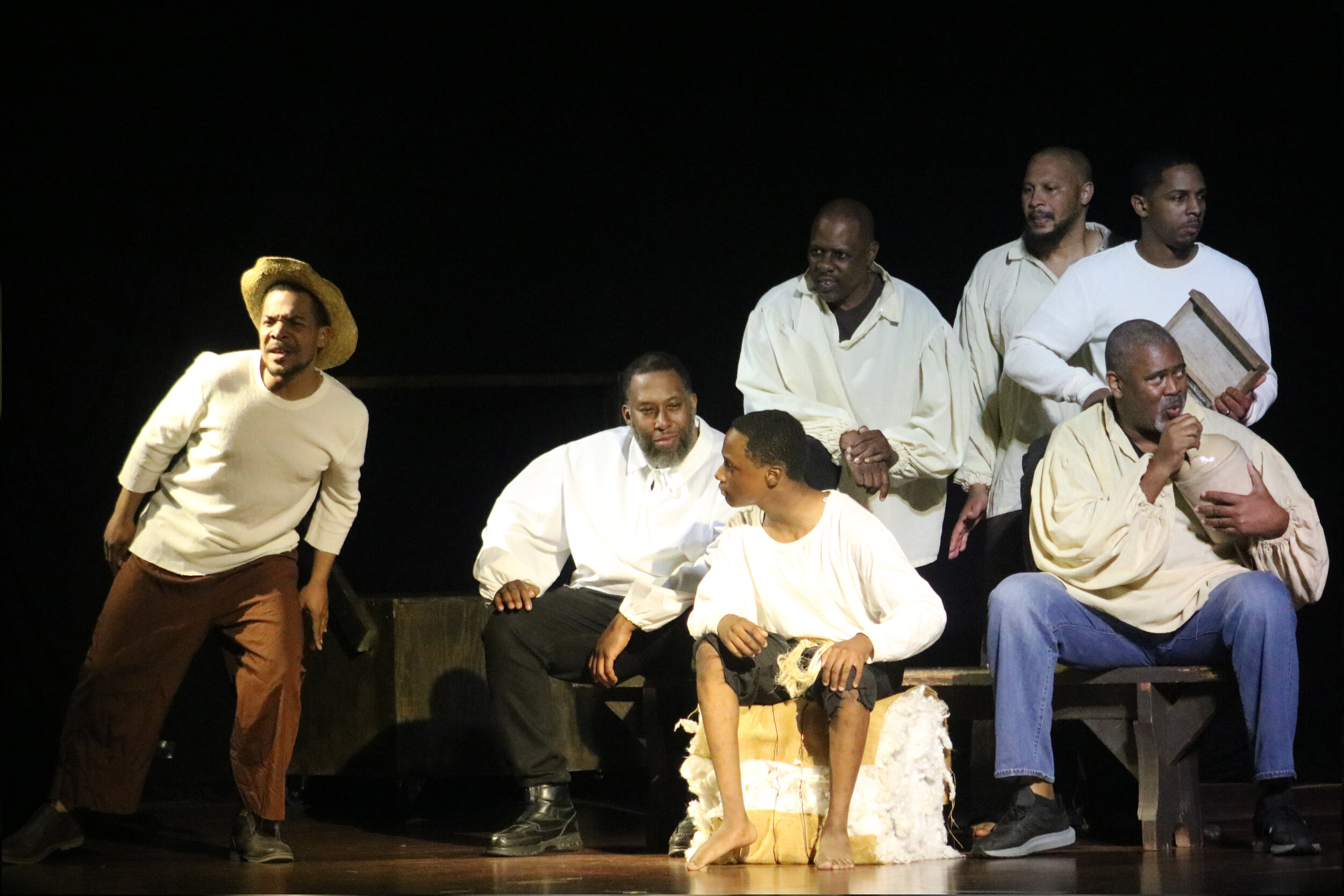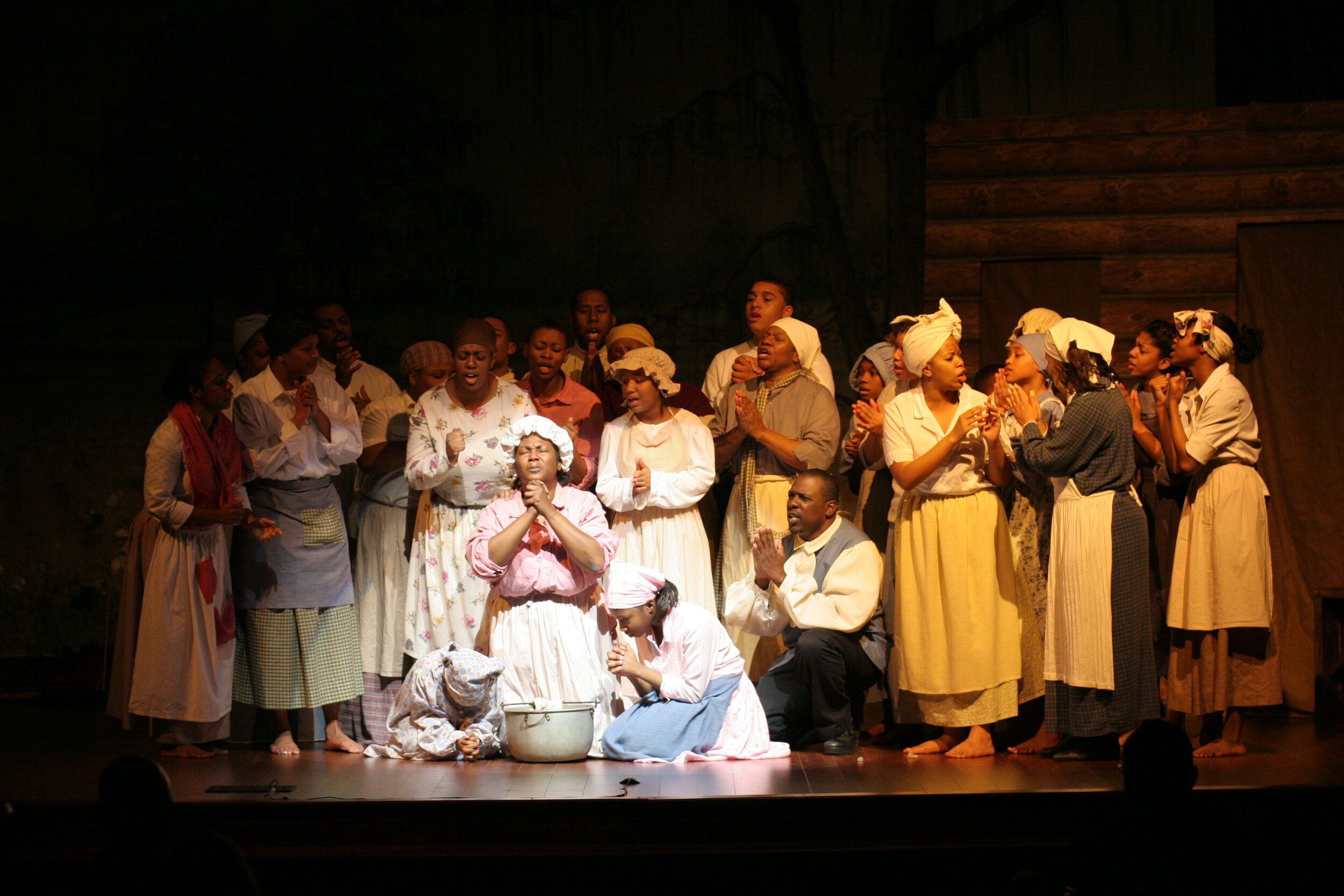An engaging, provocative journey…
Many Thousand Gone© has been recognized as a significant work of artistic excellence that celebrates the culturally rich heritage of African Americans. This dramatic musical combines the moving narratives of slaves with a stirring score of Negro Spirituals, interwoven with comedy and dance, to offer an accurate depiction of life on Southern Slave plantations. Endorsed by critics and celebrated by audiences as a “passionate, gripping and spirited musical; a triumph of the soul!”
Many Thousand Gone© is accompanied by a STUDY GUIDE and an art exhibit of period photographs, which makes this more than art and entertainment, but an engaging educational experience as well.
Because of this strong teaching component and cross curricula elements, Many Thousand Gone© has been adapted for use by some Memphis-area schoolteachers. Also GCPA collaborates with Memphis Shelby County Schools to present the production as a Field Trip to MSCS Students.
General Admission Tickets - $25, Children 12 & under - $18
Groups of 10 or more $20. For Group Tickets call 901-789-4722

“What People Are Saying”
“Many Thousand Gone was a pleasant surprise. While we have all seen many performances that depict the plight of Africans enslaved in America, the level of specificity this performance shared was refreshing. The ensemble cast was great. The singing and choreography was top notch. And on top of it all I learned a few things. Well Done!”
- Terri Freeman, President, National Civil Rights Museum
“Your performance inspired us and left an indelible mark on all who watched and listened. Thank you for bringing to life this aspect of American history.”
- Bertha Thomas, Assistant Dean of Multicultural Affairs; Truman State University, Kirksville, MO.
“Many Thousand Gone is more than an exceptional play – it is an extraordinary learning experience. I was impressed by the historical accuracy and inspired by the unique telling of the story. Excellent, educational and entertaining!”
- Dr. Joris M. Ray, Superintendent of Memphis Shelby County Schools
“I have had the opportunity to see Many Thousand Gone numerous times and I am still brought to tears and emotionally moved each time. This play, with its historical accurate, professional production, transports you back in time and you actually become immersed in the lives and stories of the characters. As a teacher educator, I believe that it should be seen in every school and college across the country.”.
- Roberta Wilburn, Ed.D., Th.D., Associate Dean, Graduate Studies in Education & Diversity Initiatives, Whitworth University, Spokane, WA
“Many Thousand Gone is a must-see production. It is very moving and touching. It takes us way back.”
- Mark Stansbury, Assistant to the President, University of Memphis
“[Many Thousand Gone] actually depicts history well, it doesn’t point fingers, and it teaches a valuable lesson.”
- John Sweet, Pastor, Covenant Family Church, Benton, IL









Study Guide
Changing the future begins with understanding the past.
It is suggested (although not necessary) that study group participants and students read through this guide prior to seeing the production.
Define then discuss the following Terms used in the production:
Allotted
Breeder
Bullwhip
Calaboose
Coded
Driver
Halfwits
Juksie
Mulatto
Negro Dogs
Nigger
Overseer
Pass
Pattyrollers
Pickled Back
“Put you in his pocket”
Yellah Quarters
The Auction Block:
On the auction block women would be separated from their men and their children. Identify some physical characteristics that were looked for in identifying a ‘good sale’ of women on the auction block?
The Plantation:
The Triads in Act 1 represent how life varied for slaves, depending on
the plantation whereon they resided,
the type of owner they had,
whether there were overseers or drivers, and
the status of the slaves.
What were some of the things that determined the status of slaves?
Discuss the various types of labor and chores slave-children performed.
Singing:
Identify three reasons the slaves sang their spirituals.
Family Structure:
Discuss the family structures of slaves.
Education:
Explain why it was against the law for slaves to get an education?
What were some of the consequences if slaves were caught trying to learn?
Food:
What day of the week were the slaves given their “rations”?
Religion:
Where are two places that slaves worshipped?
How was religion used to propagate slavery?
How did the slaves use religion to endure slavery?
Why would some slaves pray into a bucket of water?
Runaway Slaves:
What means did slave owners use to capture runaway slaves?
Discussion:
Did you notice the subtle conflict that the author introduced at the very end of the play when Queenby is given a surname?
